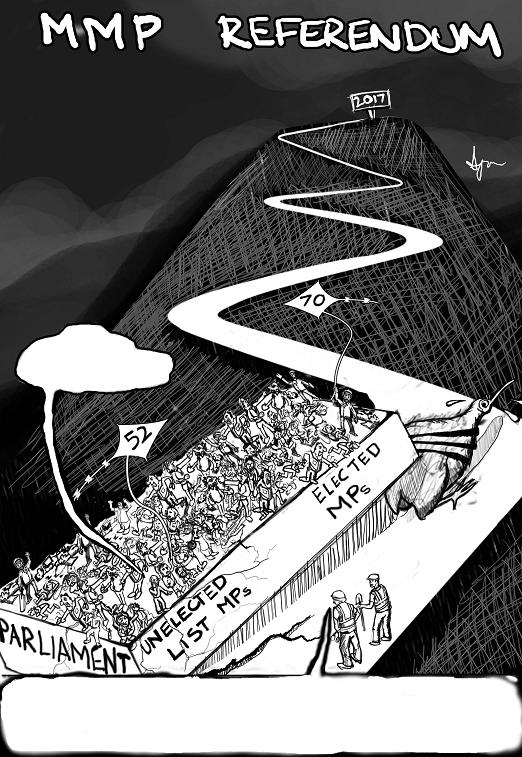David Cunliffe’s apparently-rash pledge to scrap the coat-tail rule that permits a party with less than 5% of the party vote to bring in additional MPs as long as it wins an electorate within 100 days turns out to not be quite so bold: it looks as if they simply intend to introduce Iain Lees-Galloway’s member’s bill — currently before Parliament — enacting (most of) the recommendations of the Electoral Commission as government legislation. That isn’t bad. It initially seemed as if he intended to ram through just this one cherry-picked rule under urgency, and some of us overreacted to it. There are still problems with the plan, but they are more complex.
Anyway, the episode throws light upon a lot of the tradeoffs and subtleties inherent in MMP — the major one of which is whether proportionality or equity in the distribution of proportionality is more crucial.
What MMP is good for
MMP is a rather ugly, instrumental system for balancing the expressed wishes of fickle and often arbitrary voters with regard to an volatile and rather shallow pool of political talent against the need for stability. It is not a means by which to determine moral merit, as trial-by-political-combat FPP claims to be, and nor is it a route to the mutually-least-bad choice, as in STV and related systems. It is what it is.
What it is not is an elegant expression of noble political aims. I guess this is why traditionalists dislike it viscerally: it feels kinda shabby, but it works.
“Rorts” and electorate-level match-fixing
So with that last point in mind, Danyl has said it best: the game is the game. Its job is not to look nice, it’s to deliver representative parliaments. I don’t much like it, but the utility of the kind of strategy in play in Epsom is obvious, so fair enough — as I said before the 2011 election, “If the electorate won’t punish them for doing so they’d be rude not to.”
Two things to add. The first is that the electorate clearly isn’t inclined to punish the ACT and UnitedFuture parties, at least not locally, because in the solitude of a cardboard booth, orange marker in hand, self-interest tends to overcome ethical compunctions. But the appeal to such compunctions is still the only way to reduce the viability of the “rorts”, so it is natural that those opposed will try to jawbone those compunctions. Patrick Gower is leading the charge here — although he, too, has been consistent in his derangement about this topic since before the 2011 election.
Second, the agreement between the Internet and Mana parties where Hone Harawira’s seat in Te Tai Tokerau will, they hope, bring in Internet party votes and list MPs is emphatically not of the same type as Epsom and ÅŒhariu, where major parties throw the electorate to exploit the coat-tail rule. Nobody is throwing anything in Te Tai Tokerau — in fact, it seems likely to be one of the most strongly-contested electorates in the country, a fact which is causing conniptions in some quarters. While the electoral outcome will look similar to the undiscerning eye, the Internet MANA deal is different — smaller parties allying to overcome structural barriers to their participation in democracy. Not only is it not only not a rort, it is perfectly just and rational behaviour in the face of an iniquitous system.
Consensus and timing of law changes
In general there should be consensus in changes to electoral law. But I agree with Rob Salmond that “should” is not the same as “must” — the object is to be sure that changes will be generally popular, and will be durable, and in this case an independent commission and the deep consultation that occurred during and after the referendum strongly suggests that implementing the recommendations via the Lees-Galloway bill will be both those things.
But timing matters: now that Internet MANA has declared its hand and chosen to take advantage of the coat-tail rule in a similar way as ACT and UnitedFuture, it would be unjust to change the rule immediately before the election. Depending on how things play, it might still be unjust to change the rule without further consultation after the election, because it may be that people see in the Internet MANA a new way to challenge the entrenched parties (I plan on writing more about this if I get time). For this reason it is good that John Key has ruled out supporting the Lees-Galloway bill.
Proportionality versus equity
All that having been said, I favour scrapping the coat-tail rule. Even though, as Graeme Edgeler has explained, it increases proportionality rather than decreasing it, mitigating the effect of the 5% threshold that kept New Zealand First, with 4.07% of the party vote, out of Parliament in 2008. The trouble is that it increases proportionality selectively rather than equitably — that is, among minor parties who are willing and able to become the vassals of larger parties — as Gower said in 2011 “It’s finally official: John Key owns the ACT Party.” Proportionality in an instrumental system is not an intrinsic good that automatically trumps other considerations. Process does matter. But outcomes matter too.
Political clientism in an instrumental system is not so much morally or ethically wrong as it tends to degrade representativeness, and delivers huge benefits to the strongest parties — who have the ability to burn political capital to take advantage of these sorts of relationships — in ways other parties cannot. So while you get the appearance of more diverse representation, the effect is more that the liege party gets to offload political risk and responsibility to its vassals. The clearest case of the present government is the charter school policy that, had National passed it of its own volition, would have endangered Key’s moderate reputation. ACT’s presence in parliament — even without deputy leader Catherine Isaac, who was outrageously granted the sinecure implementing the charter schools plan — gave the government cover to implement policy they wanted, but which was too politically risky.
Self-interest dressed as principle
So to an extent the proposal from Labour is sour-grapery from a political middle power that is neither big enough to be able to benefit from the coat-tail rule, nor small enough to potentially need it. For all their posturing about the integrity of the system, I am sure they would use it if they could get away with it (as they did in Coromandel in 1999), but they can’t. They have no potential clients, so they have no need for the coat-tail rule. The Greens, secure above the threshold, don’t need them for this, and they (correctly, in my view) regard Internet MANA as too radical for such a relationship. The retreat to electorate nostalgia is also strategic positioning from a party that has seen the resentment that exists towards list MPs, and has pledged to re-take the provinces and rebuild its electorate network.
National’s refusal to implement the findings of the commission also come clearly down to self-interest. They are so far the major beneficiaries of the coat-tail provisions, having used their two vassal parties to good effect through both terms of their government.
Ultimately while both the major parties’ positions are self-interested, Labour comes closest to the right conclusion: that the iniquity of the coat-tail rule’s additional proportionality is a greater cost than the additional representation gained by it is worth. The best cure for the problem is to cut the party vote threshold — to 1/120th of the party vote, or a “full seat”, which would obviate the coat-tail rule. Scrapping the coat-tail rule is a rather distant second-best outcome, but doing that as well as cutting the threshold to 4% as recommended by the commission seems like the sort of compromise with which nobody will be totally happy, but which will endure.
Because functionality is what matters, not perfection.
L





